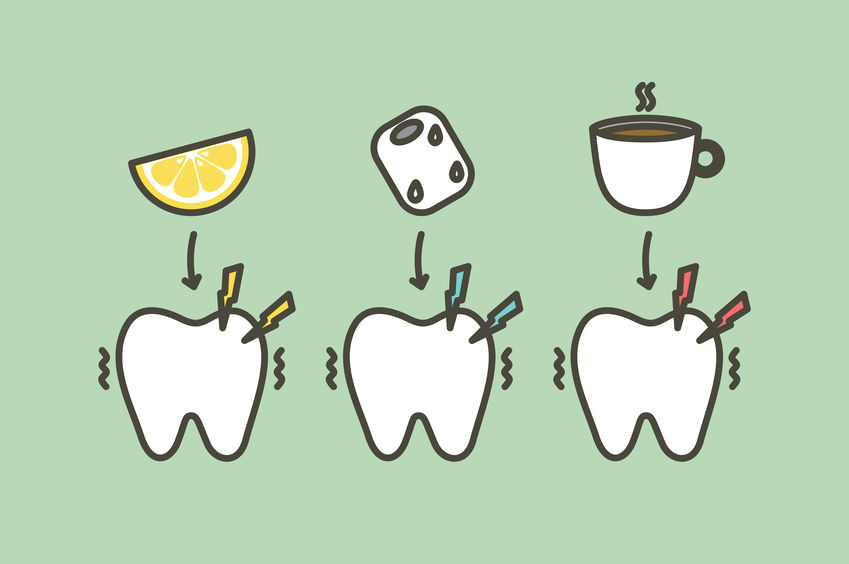
Odds are that at one point or another you’ve experienced pain or discomfort after taking a bite of fresh-from-the-freezer ice cream or a heaping spoonful of super hot soup. This sensation is linked to tooth sensitivity. Although pain caused by hot or cold food and drink can sometimes be a sign of a dental problem, your Chattanooga family dentist will also tell you it could just be the result of having sensitive teeth.
Tooth sensitivity is also known as “dentin hypersensitivity,” and can be a temporary issue or a chronic problem depending on the patient and circumstances. You may notice your teeth are sensitive to specific stimuli, like extreme temperatures. Sometimes these symptoms come and go or range in severity from mild to intense. Common triggers for tooth sensitivity include:
Some dental patients experience tooth sensitivity because of a naturally thinner layer of enamel than is common. The enamel is the outermost layer of the tooth that serves to protect it from outside elements that cause decay. Sometimes other factors cause the enamel to wear and break down over time. Such factors include:

Other factors such as gum recession, tooth decay, broken or chipped teeth, and worn down, damaged fillings or crowns can also result in exposed dentin, causing tooth sensitivity. If this is the case, you’ll likely only feel sensitivity in that one area of the mouth as opposed to a general feeling of sensitivity. Sometimes dental work can leave the teeth feeling sensitive for a few days post procedures, and whitening efforts can have a similar effect. That said, in cases such as these, symptoms tend to reside quickly.
If you are experiencing tooth sensitivity for the first time, you should make an appointment with your Chattanooga family dentist. When you have a routine dental cleaning and/or exam, your dentist can check for potential issues that could be causing your tooth pain. Cavities, recessed gums, or loose fillings could be the culprit. Regardless of the cause, your dentist can help you find relief for the sensitivity you’re experiencing via several different treatment options.
Your Chattanooga family dentist will assess your dental sensitivity, and make treatment suggestions based on what the root cause may be. For example, if you’re suffering from the symptoms of GERD, acid reducers can help treat the symptoms of that ailment, while also helping to safeguard your tooth enamel in the process. If receding gums may be the cause, your dentist may suggest you use a different type of toothbrush or methods of oral hygiene, or if severe enough, may suggest a gum graft course of treatment. Treatment may be as simple as switching the type of toothpaste or mouthwash you’re using.
No matter what the cause of your tooth sensitivity, the staff at Tedford Family Dentistry wants to help you resolve it. Contact our today to schedule an appointment. Relief is achievable, and we want to help you find it!
COVID-19 has changed our daily lives in so many ways, and social distancing or sheltering in place means we don’t have the luxury of rushing out to see our Chattanooga dentist at the first sign of a dental problem. That said, we’ve rounded up some home remedies for toothaches and other tips that might help you avoid dental disasters during these difficult times.
Not having ready access to a dentist means you should definitely pay extra attention to your regular dental hygiene habits. Be sure to make brushing your teeth and flossing a priority. It shouldn’t be an issue since we’re all spending so much extra time at home, right?
Another important thing is to make sure you’re wearing your night guard regularly if you have one. Many of us grind our teeth at night while sleeping, and suffer from bruxism, which can cause a lot of damage to otherwise healthy teeth. These issues are exacerbated in times of stress, so to all our night guard wearers, approach it religiously during these times.
All this said, if you find yourself experiencing tooth aches while you can’t be seen by a dentist, here are a few things you can try to help ease the pain until you can get the dental care you need.
This might seem like a basic step, but you’d be surprised how effective a salt water rinse can be in combating dental pain. Sometimes food particles or debris can become lodged between your teeth and cause minor infections that can be painful. As salt water is a natural disinfectant, sometimes a salt water rinse can help heal oral wounds as well as decrease inflammation in the mouth that can be the source of your discomfort. Try mixing about a half teaspoon of salt into a small glass of warm water, then swish it in your mouth a few times just like you would use a mouthwash. Spit, and repeat. Try this a few times a day to see if you can get relief from your tooth pain.
Hydrogen peroxide, like salt water, can help to relieve pain and inflammation caused by dental issues. It also kills bacteria and can help heal irritated or bleeding gums. Make sure you dilute the peroxide before using as an oral rinse. Cut the peroxide half with water, and use it as a mouthwash. Do not swallow.

Sometimes peppermint tea bags can serve as a quick home remedy for sensitive gums. The peppermint acts almost as a numbing agent to the affected area, and offers some relief in some cases. Allow the tea bag to cool down some before applying, but it should still be somewhat warm. Peppermint actually has many health benefits, acting as a remedy for many ailments. It also kills germs in the mouth. Learn more about the benefits of peppermint through a WebMD write up here.
A cold compress is another quick home remedy for toothaches and other oral pain, especially in instances that involve trauma to the tooth. The cold compress causes the blood vessels in the area to constrict, which consequently makes the pain less severe. Cold also helps to reduce inflammation and swelling associated with the tooth issue.
Clove oil contains eugenol, which happens to be a natural antiseptic. Because it reduces inflammation and numbs pain, clove has been used throughout history to treat toothaches. Apply a small amount of clove oil to the affected area with a cotton ball or q-tip a few times daily. You can also add a drop or two of clove oil to water to make a rinse.

We hope these home remedies for toothaches help get you through any minor dental issues you’re experiencing while COVID-19 has you stuck at home. Many toothaches will require dental attention, but in the meantime try these methods for reducing pain. That said if your toothache is severe enough or does not subside, you will need to seek dental care.
You should also contact us if you experience fever, swelling that does not subside, pain when you bite or chew, red or visually inflamed gums, or trouble swallowing. Our team at Tedford Family Dentistry wishes health and safety for you and yours during these trying times.
Protecting your child’s teeth from decay and other problems is an important task for parents, and there’s lots of advice out there– good and bad. We all know cavities and dental problems can be both painful and costly, so working to actively avoid them for ourselves and our kids is something to approach with intention. Did you know that certain foods are great for dental health, while others can be particularly damaging? Our expert pediatric dentists at Tedford Family Dentistry in Ooltewah have compiled a list of best and worst foods for your child’s teeth, so you can stay informed and take a proactive approach to teaching your children healthy dental hygiene.

Sugary Drinks–
You guessed it! You may not be aware of just how teeth-damaging sugary drinks and sodas can be. The acids and sugars beverages like soft drinks and juices contain can really work against you causing tooth and gum damage. The sugar works as a fuel for bacteria in the mouth, turning it into an acid that eats away at tooth enamel, the outer protective layer of the teeth. Over time, this leads to tooth decay and– of course– cavities, so it’s important to try to limit your child’s intake of these types of drinks.
Sticky, Chewy Candy–
Chewy and sticky types of candy like caramels, taffy, and gummies tend to stick to the teeth for a long time. They also have a tendency to get stuck between the teeth or even leave a sugary residue behind that attacks and dissolves tooth enamel.
Chips, Pasta, & Bread–
This one may come as more of a surprise, but consuming lots of high-carb foods like chips, pasta, and bread can also have an adverse effect on tooth health. These starches are often made from white flour, which turns to simple sugars inside the body. These simple sugars can lead to tooth decay!

Milk, Cheese, & Yogurt–
Milk, cheese and yogurt are foods that are rich in calcium, phosphorus, and casein, all of which can help protect tooth enamel. Also, some of the nutrients found in milk can have a neutralizing effect on the acid that is produced by plaque bacteria in the mouth each time your child eats or drinks. So in short, not only is milk good for the bones, but it’s also great for the teeth!
Eggs–
An excellent source of protein, calcium, and vitamin D, eggs are great for oral health, as these minerals are key players in that arena. Vitamin D plays a large role in the absorption of calcium, and both of these vitamins help kids maintain strong and healthy teeth.
Apples, Carrots, & Celery–
Chewing apples, carrots, and other crunchy items that are high in fiber can actually scrub plaque off of your child’s teeth! These foods also make for healthy, easy-to-prepare snacks that are full of vitamins and minerals. Carrots and apples are also high in water content, and require a lot of chewing, which means more tooth-scrubbing action. An apple– who knew it was nature’s toothbrush!
Best and worst foods aside, it’s super important to teach your children healthy dental habits from the beginning. Show them how to properly brush their teeth, as well as floss them, and make sure they’re doing so twice a day for at least two minutes each time, per the ADA’s recommendation. If you need more advice or are looking for a great family dentist in the Chattanooga area, get in touch with Tedford Family Dentistry today!
When it comes to oral hygiene, there are many myths floating around that may cause confusion about what actually IS right, good for you, and necessary when it comes to your dental health. How often should you see your Chattanooga dentist? How many times a day should you brush your teeth and for how long? And then there’s flossing. What are the hard and fast rules about flossing your teeth? And what myths beg busting? Below are a few flossing myths your friends at Tedford Family Dentistry would like to debunk in effort to afford you some clarity on the subject.
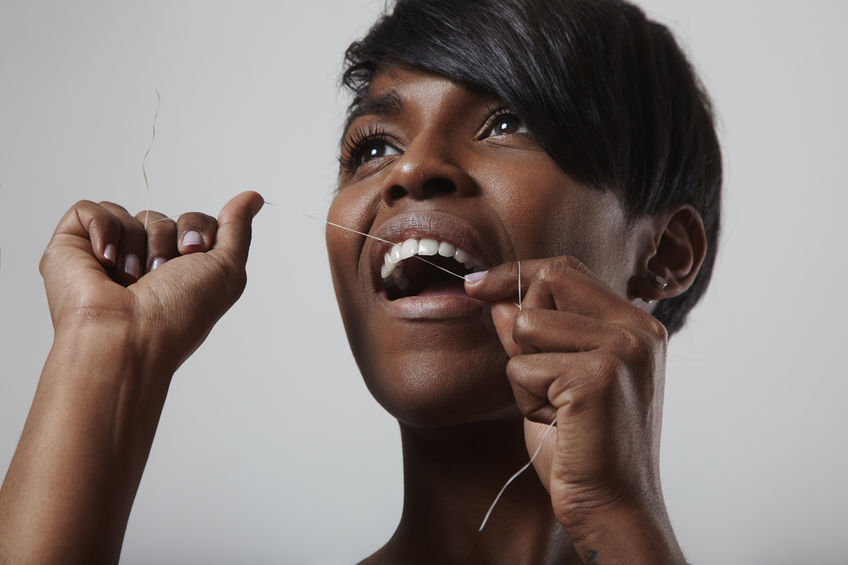
OK, no. It’s certainly true that flossing comes in handy when you have annoying food particles stuck between your teeth; however, that’s not the sole purpose of this dental care task. Flossing your teeth does help to remove hard-to-reach particles, germs, and plaque or tartar from spaces your toothbrush might not adequately reach. You should really floss your teeth at least once a day, and generally right before bed works best. That way your mouth is clean for sleep– no lurking cavity-causing food particles hanging around.
Wrong again, friends. It is important for children to also floss their teeth! For the same reasons it’s important for adults, children can also get food stuck between their teeth that if left behind, can cause decay or other issues. Younger children will need help with the task! Generally kids around age 6 or 7 can start handling the flossing on their own. Teach them the ways early to help build a foundation for healthy dental habits that will become long term.
Honestly, if flossing your teeth is causing you pain, you’ll need to get in touch with your Chattanooga dentist. Flossing might be uncomfortable if you’re not used to it or already in the habit of flossing your teeth regularly. If you have some minor discomfort, it’s probably because you have not been flossing as often as you should. Try to form the good habit of flossing daily, and the discomfort should subside. That said, pain is an indicator of a problem.
Flossing can be mildly awkward if you’re not accustomed to it, but it’s not difficult. It’s also something that takes next to no time at all once you get the technique right. The more you work it into your daily hygiene routine, the more adept you’ll become at accomplishing this critical task quickly. If you have a hard time reaching your very back molars, try Y-shaped floss picks or other interdental cleaners. In fact, interdental cleaners are great for cleaning properly around crowns and bridges, and generally hard-to-reach areas.
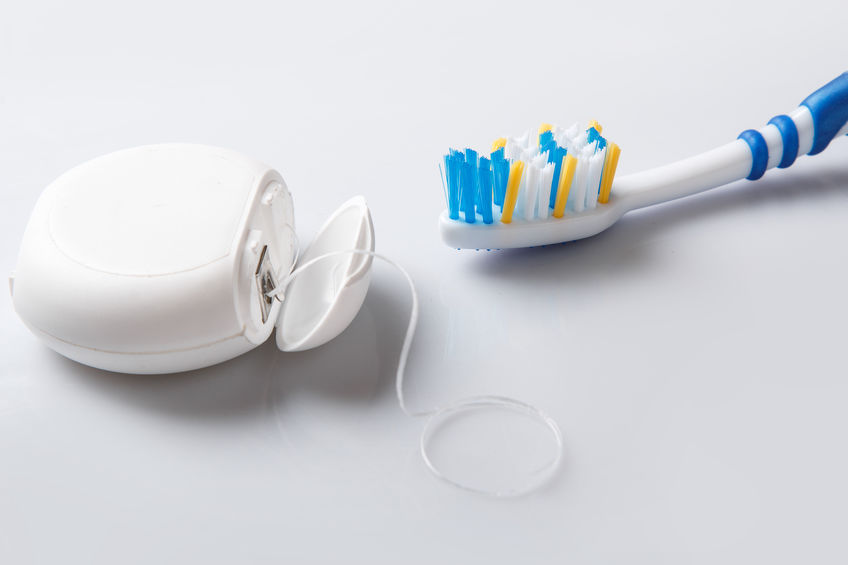
Wrong! There is a correct way to accomplish appropriate dental flossing, and if you’re not doing it correctly, you might be missing some food particles and plaque. Yikes! The most effective flossing method involves using roughly 18 inches of dental floss, winding it around the middle finger on each hand, and holding it between your thumbs and forefingers. Then you slide the floss up and down between two teeth, curving the floss around the top of each tooth, and gently flossing beneath the gumline to remove plaque, tartar, and left-behind food. When you move to clean between the next two teeth, shift the floss as well using a new area.
It’s important to make sure you have accurate information when it comes to your dental health. You’ve only got one set of permanent teeth, and it’s so critical to take every step to care for them well– from regular dental cleanings and exams to making healthy food and drink choices to brushing and proper flossing practices. We hope you found this list of overturned flossing myths informative and helpful. If you have questions or need to set up an appointment, get in touch with our Tedford Family Dentistry staff today! We’d love to help. P.S. Floss your teeth!
When it comes to dentistry for children, you may be totally lost as a new parent. In fact, parents have a million things to think about, learn, and frankly figure out how to do right, but knowing what your child needs and when can be tricky sometimes. Especially as a brand new parent, there are a great deal of unknowns– but when it comes to your child’s dental health, there doesn’t have to be. Our staff at Tedford Family Dentistry in Ooltewah is here to guide you as you work to ensure your child or children have the healthiest teeth possible, and the best pediatric dental care Chattanooga has to offer, and the knowledge and tools necessary to properly care for their teeth for the long haul.
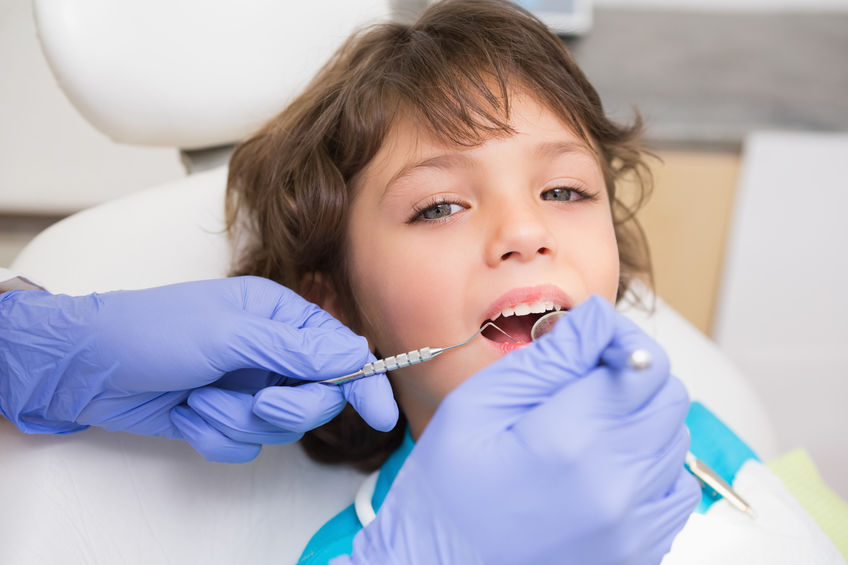
Great dental care and habits should start early. How early? Well, as soon as your baby starts having teeth come in, you should begin to take care of them. By age one, your child should probably see a pediatric dentist. These initial visits are more about establishing comfort with seeing a dentist, and so that parents can receive helpful information about how to best care for their baby’s first teeth. By age two, it’s recommended that your child start with the twice a year dental cleanings and check-ups. Between ages four and six, your child’s dentist will start taking x-rays to ensure your child doesn’t have any cavities or potential issues that need to be addressed.
Seeing your pediatric dentist regularly is important for dental health, but it will also help your child get comfortable about the whole dentist office experience. Choosing a dentist you trust (cough, Tedford, cough) is a great first step in a lifetime of great dental health, and once a relationship is established, you can enjoy many years of great dental care in a space where you feel at ease. Build a relationship with a dental provider you trust, and that dentist will get to know you or your child, your teeth, and your history. This holistic, big-picture understanding will also help ensure you receive the best possible dental care every time. From losing and getting new teeth to possible cavities to sealants and even orthodontic referrals, your pediatric dentist will be with you each step of the way guiding your treatment plans.
After you find a dentist and set up a schedule for routine dental cleanings and exams, you’ve done the hardest part and laid your groundwork. Then, all that’s left to do is teach your kids healthy dental habits and hygiene! As always, a lead-by-example approach is a great place to start. Make sure your children witness you practicing what you preach. Make sure they see you brushing and flossing everyday– okay, they don’t have to literally watch you do this every single day, but make it clear to them that you’re doing what you expect them to do too. Make sure you’re teaching them proper brushing techniques, and that they are brushing for the recommended 2 minutes.
You’ll also want to make sure your kids don’t do things like grazing or drinking too many sugary drinks. These things can be detrimental to tooth health, working like a near-constant attack on enamel. Establish meal times that start and end, and encourage your children to drink water throughout the day to help keep their mouths as healthy as possible.
If you’re looking for a family dentist, we’d love for you to consider becoming a part of the Tedford family. We have proudly served patients in the Ooltewah, Cleveland, and Chattanooga areas for years, and we’d love to take care of you and your family. Exceptional family dental care, customer service, and a pleasant environment make us a great choice for any family. Get in touch today, and let us help you on your path to the healthiest possible smile.
As the end of the year approaches, we all do a little soul searching, setting intentions for the new year. It’s always nice to have a clean slate– a fresh start of sorts. The first of the year is the perfect time, if there ever was one, to resolve yourself to taking better care of your teeth! Maintaining healthy gums and healthy teeth is a really lovely goal to work towards on your own or maybe with your whole family.

The thing about New Year's resolutions is you’ve got to be realistic, and do whatever you can to set yourself up for success. One great way to achieve this is to work toward a common goal with your whole family. You and your partner and kids can all work toward healthy gums and teeth together! Make it a goal. Here are a few tips to help you stay the course with a resolution for better dental health.
Accountability- Hold each other accountable! Ask your kids if they brushed and flossed each morning and before bed. Remind your spouse to swish with a mouthwash to help kill bacteria and promote a healthier mouth. You can even ask your dentist at Tedford Family Dentistry in Chattanooga to recommend a toothpaste and mouthwash combination that’s best for you and your family.
Talk about it!- Talking about your resolution to practice healthy dental habits will only reinforce your goal, both in your own mind and with those around you. Being vocal about it will help encourage and motivate you, and your family as well, if they are taking this dental health journey with you!
Track your progress- This is especially helpful with children! Make your kids a chart and use stickers to track how well they’re doing with teeth brushing and flossing. That visual representation of effort is always encouraging and motivating. You could even work out a reward system to treat them for a job well done.
Involve your dentist!- Ask your dentist at Tedford how to best maintain healthy gums and teeth. Ask for recommendations about what steps you can take that are specific to your teeth and your personal goals, and always stay on schedule with regular dental cleanings and exams.
Go above and beyond brushing and flossing- There’s more to a healthy mouth than just the obvious basic daily care habits. Avoid sipping on sodas and other beverages (other than water) throughout the day, as these items can eat away at tooth enamel making it more susceptible to decay. Also don’t graze on food. Eat regular meals and maybe a snack or two a day, but in the interim, give your teeth a break.
All of us at Tedford Family Dentistry hope these tips are encouraging to you, and that you’ll consider a resolution related to your dental health. We also hope you and yours have a wonderful holiday season, and ring the new year in right, but what’s more is we hope you reach your personal goals you set for yourself. If better dental health is a goal of yours for 2020, just know we are here cheering you on, and happy to help in any way we can. Cheers to a happy, healthy new year, and hopefully happy, healthy gums and teeth.
Perhaps once upon a time, all you wanted for Christmas was your two front teeth– but now as an adult, maybe there’s still room for you to love your own smile more? It’s amazing the level of confidence you can find in having a beautiful, white smile. If that’s something you aspire to, our expert staff at Tedford Family Dentistry wants to help.
At our office in Ooltewah TN, we offer all kinds of cosmetic dentistry services, and there’s never been a better time to take steps toward your best smile– just in time for the holidays. At our office, we can help with dental implants, dental veneers, teeth whitening for your brightest smile, cosmetic fillings, and contouring. No matter what condition your teeth are in, our dental staff is here to help restore your smile, whether that’s with something as simple as a whitening treatment, or something as involved as implants.
Sometimes to accommodate tooth loss, your dentist will recommend dental implants. These artificial root replacements are surgically positioned into the jawbone beneath the gum line with the use of metal posts or frames. This process allows for the secure positioning of replacement teeth, and generally results in a more healthy and youthful looking smile.
Pros and Cons of Dental Implants
Pros:
Cons:

Dental veneers are thin pieces of porcelain bonded to the teeth to recreate a natural, beautiful smile. They also behave like actual teeth, boasting strength and resilience much like natural tooth enamel. Dental veneers can be used to fix chipped or broken teeth, as well as uneven, worn down, or misaligned teeth, creating a more aesthetically pleasing smile.
Pros and Cons of Dental Veneers
Pros:
Cons:
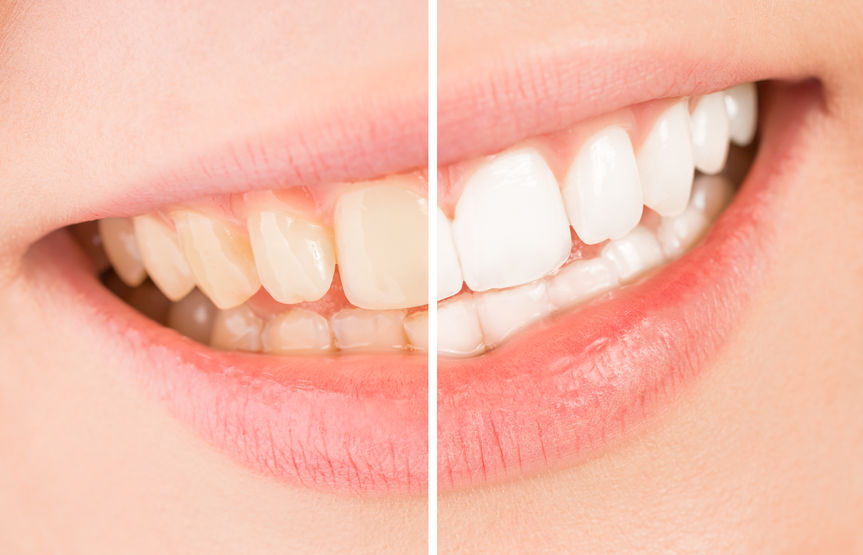
Let’s face it. Some of us don’t have teeth as white as we’d like. Lots of things can cause teeth to discolor and stain– smoking, drinking coffee, tea, and red wine, aging, trauma, and of course, poor oral hygiene. Some of us just naturally have teeth of a darker shade, but whitening is always an option. At Tedford, we can help you achieve your whitest, brightest smile!
Pros and Cons of Teeth Whitening
Pros:
Cons:
At Tedford Family Dentistry, we will work to ensure trays fit properly to avoid these potential issues. With the holidays coming up, maybe you should treat yourself to the smile you’ve always wanted. If you are considering cosmetic dental procedures, we hope you’ll consult with our dentists at Tedford Family Dentistry. We are here to answer any questions you might have about potential treatments that can help you achieve your best possible smile. Get in touch today, and start the process.

It’s candy season, folks, and it all kicks off with Halloween. Late October ushers in the several-month-long stretch of holiday parties at school, at the office, with friends, and with family– and the common thread running through these get togethers? Abounding treats. Halloween is the first of the candy-laden holidays, and every kid you know is soon to have a pillowcase full of sugary confections they will indulge in for weeks to come. First Halloween, followed by Thanksgiving and Christmas. The treats will be in full supply all the way through the New Year, and the near constant intake of sugar can really take its toll on teeth. For this reason, we’ve put together a comprehensive list of how you can prevent cavities and tooth decay from sneaking up on you throughout the holiday season.
You guessed it. The most important way to keep teeth healthy and stay on top of cavity prevention is good, old-fashioned brushing and flossing. You and your kids should be brushing for 2 minutes, twice daily and flossing before bed anyway, but during the holidays with all the cookies and candy, it’s even more imperative to be diligent about these habits. Your friends at Tedford Family Dentistry also suggest, at least for older kids, that incorporating a cavity-fighting mouthwash can help ensure bits of sweet treats don’t take up residence in those hard-to-reach spots and cause decay.
 2- Drink A Lot of Water
2- Drink A Lot of WaterWater intake is key to wellness for so many reasons, but it’s also imperative for maintaining a healthy mouth. Not only does water help loosen and remove food particles and bacteria on and around the teeth, but it also has a neutralizing effect on plaque acids while encouraging the flow of healthy saliva. Each swig of water acts as a quick rinse for the mouth and teeth, and is an all-around healthier alternative to holiday drinks like soda or punch. Plus, the fluoride in drinking water is nature’s best cavity fighter. Enjoy the festive beverages in moderation, but be mindful of the important role water plays in keeping your teeth in great shape.
It may seem like a good idea to slowly munch on cookies and holiday candy, spacing it all out over time; however, this is not the case. Think about it this way– basically everything you eat or drink nourishes the bacteria present in your mouth. Then, said bacteria produces acid which attacks the enamel on your teeth, depleting the minerals that comprise them. It takes about 20 to 30 minutes for the acid levels to neutralize or return to normal levels. Therefore, when you slowly graze on sugary food and drink, you prolong the amount of time your teeth are subjected to the effects of these harmful acids. For this reason, it’s much better for you and your children to partake in your snacks and treats at one time, then give your teeth a needed break.
Between the sticky holiday candy, caramel corn, and pie, you should sneak in some healthy snacks too! Remember that crunchy vegetables like carrot sticks and celery are not only good for your body, but also help clean off the surfaces of your teeth. Interestingly enough, cheese is also a good choice! Especially if you’re enjoying an alcoholic beverage or two at a holiday party, calcium in the cheese can help neutralize acids from the drinks while also strengthening your teeth. Sneak these snacks onto your kids’ party plates as well, instilling good, balanced habits and healthy choices.
Though the last few months of the year tend to be the busiest, don’t skip your regular trips to the dentist! This is probably the most important time of year for staying on top of exams and cleanings. Catch issues early, and use preventative measures like flouride treatments to avoid issues that can worsen over time if not treated. Enjoy the fun holiday season with all their tricks, treats, gifts, and get togethers– but not at the expense of proper oral care. The staff at Tedford is here to help you with all your family dental care needs, so don’t hesitate to reach out to us!
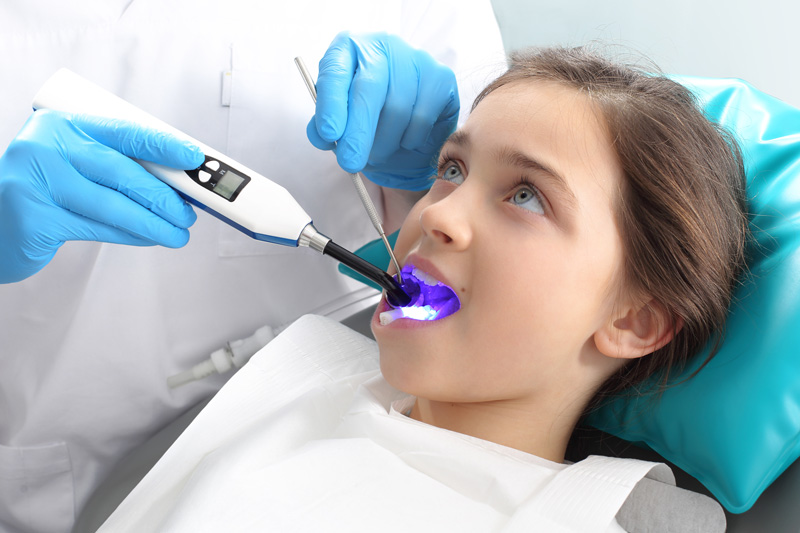
The staff at Tedford Family Dentistry in Ooltewah, TN always stresses the importance of taking care of your teeth. Regular brushing and flossing, avoiding sugary food and drinks, and consistent cleanings and dental exams are all crucial in maintaining a healthy mouth. When we slack on these things, the effects can often be painful and extremely costly to rectify. Filling cavities, getting root canals and needing crowns are things we all want to avoid. But in addition to proper cleaning, dental sealants are a great way to help keep tooth decay at bay.
Molars can be rough and craggy, with lots of tight nooks and crannies for food particles and bacteria to hide. This is where sealants come in! You can actually safeguard your child’s molars with these thin, protective coatings that can actually keep cavities from forming, as well as keep minor tooth decay from progressing into full-blown cavities that require fillings.
According to the Centers for Disease Control and Prevention, dental sealants prevent 80% of cavities in back teeth or molars, where 9 out of 10 cavities occur. The CDC also reports school-aged children without sealants have almost three times more cavities than children who do have sealants.
Sealants are basically like armor for your teeth. After application, the sealants keep bits of food, germs, and bacteria (the recipe for cavity-making) from settling on the surfaces of the teeth, just like a shield would protect you in battle.
Your dentist can quickly and easily apply sealants to adult and baby teeth in both adults and children. It’s a completely painless and non-invasive process. Your dentist will first clean and dry the surface of the tooth then place on it an acidic gel. The gel acts as a bonding agent for the sealant by creating a rougher surface for it to grab onto. After applying this gel and allowing it to set, your dentist will simply rinse it off, apply the sealant material, then harden or set it with a special instrument called a dental curing light (also used for fillings, etc).
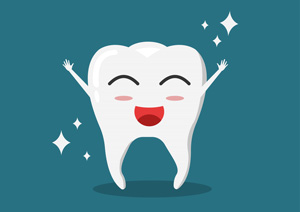
Many dental insurance plans cover the cost of sealants. If you’re not sure about your coverage, call your provider to check in about it. Covered or not, sealants should be part of every parent’s low cost dental care regimen, as they can prevent cavities and other dental problems that are extremely costly to address. As purveyors of great dental care from pediatric dentistry all the way through adulthood, the staff Tedford Family Dental recommends all children have sealants applied to their teeth. Preventative is always the best approach when it comes to a healthy mouth.
Start ’em early! It’s never too soon to start imparting to your children the importance of good oral hygiene. Experts say as soon as your baby starts getting teeth in, you should begin cleaning them, and here at Tedford Family Dentistry we fully subscribe to this belief. You can start by wiping your baby’s teeth clean with a soft cloth and warm water. When your baby reaches the 18 months mark, you can begin brushing your baby’s teeth with a pea-sized amount of low-fluoride toothpaste. As they grow, they can begin taking more and more ownership of the task, but for a good while, they will need a lot of help and supervision.
Establishing these good oral health habits out the gate will help reduce the risk of tooth decay and cavities in baby teeth, of course, but getting into an early routine of regular brushing will also likely carry over into adulthood. Make it a priority to help your young children brush their teeth at least twice a day, and increase the chance that those good habits will stick.
When your little ones are young, it’s helpful to find ways to make brushing fun. Let them choose their own toothbrush at the store with colors or characters they love. Brush your teeth with your child, or even let them brush your teeth for fun. Use a timer so it feels like a game, but also reminds them to brush for the right amount of time, ensuring they target each area of the mouth for a thorough cleaning.
It’s no surprise that kids who learn great brushing and flossing habits early in life experience far less dental issues in adulthood. Laying that foundation is imperative. By age 5, nearly 50% of children have had one or more cavities! A lot of parents buy into the belief that decay in baby teeth doesn’t matter since those teeth will eventually be lost and replaced with permanent ones; however, this is a gross misconception. Decay in baby teeth can, in fact, have an adverse effect on the health of adult teeth, and can lead to dental issues later in life. This is why it’s so important to be proactive about preventative care from the get-go, caring for your baby’s teeth as soon as they begin to come in.
Every pediatric dentist would agree that teaching your kids to actually brush their teeth with regularity is only part of the job. You also need to teach them the proper techniques to be completely successful. Most parents are familiar with this scenario. Your child puts a glob of toothpaste on a toothbrush, half of which finds its way into the sink (aka NOT into your child’s mouth), and he or she spends maybe 15 seconds lathering it up before a quick spit, and they’re on their merry way. Not gonna cut it. You can help your child learn how to do a better job by demonstrating the best way. Brush your teeth at the same time, showing your child the best brushing techniques. This way they can also get a better feel for how much time they should be spending on the task.
The American Dental Association recommends a full two minutes of brushing. Several seconds of aggressive brushing can actually be harmful and cause distress to teeth and gums. This is a great case of slow and steady wins the race. Teach your kids to take their time, concentrating on all surfaces of their teeth, as well as the tongue and gums. Lots of bacteria live here, and it takes diligence to combat those germs that can cause bad breath as well as gingivitis.
Leading by example will be key in teaching your children these healthy oral care habits, but you should also ensure they receive the recommended preventive care from an expert pediatric dentist. That’s where we come in! At Tedford Family and Pediatric Dentistry in Ooltewah, TN, we take a preventative approach and believe trips to the dentist can be fun. We go to great lengths to ensure our young patients have positive experiences each time they come in to see us, and we are in it for the long haul. Whether the patient is one year old, or ninety, we believe in providing the best possible care, encouraging great habits, and keeping your pearlies looking and feeling their very best.